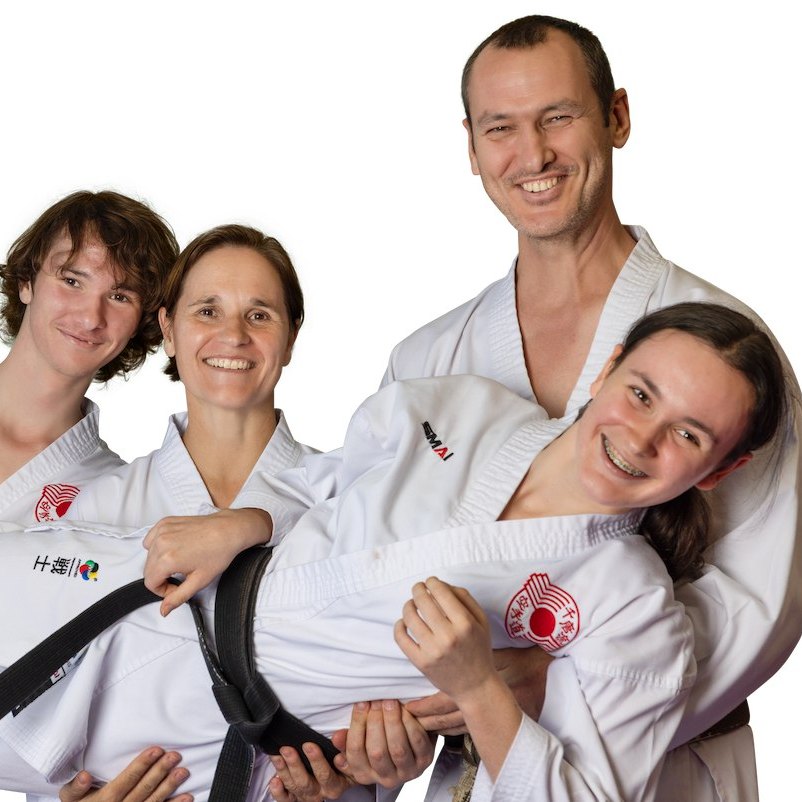Discover How Traditional Martial Arts Principles Can Transform Your Approach To Daily Life.
In our fast-paced world, it’s all too easy to feel overwhelmed, anxious, and disconnected from the present moment. Many teens and adults grapple with low energy, negative thoughts, and stress, seeking ways to regain a sense of control and happiness.
As someone who has practiced martial arts from a very young age, I’ve discovered that karate offers profound solutions to these modern-day challenges. Through the continual pursuit of mastering mind, body, and emotion in the dojo, I’ve found techniques that not only enhance physical abilities but also foster mental clarity and emotional balance.
Research supports the idea that physical activity and mindfulness can significantly improve mental health. According to a study published in the journal Psychiatry Research, mindfulness practices can reduce symptoms of anxiety, depression, and stress by promoting better emotional regulation and increased awareness .
Moreover, a report by the American Psychological Association highlights that regular physical activity, including martial arts, can enhance mood, boost energy levels, and reduce symptoms of anxiety and depression .
These findings align with my personal experiences and observations in the dojo, demonstrating that the principles of karate can be a powerful antidote to the pressures of modern life.
We’ve all been there—those days when getting out of bed feels like a monumental task, when negative thoughts seem to take over, and when anxiety and stress make it hard to focus on anything else.
These experiences are incredibly common. Many of us share these struggles, even if we don’t always talk about them. It’s important to acknowledge that feeling this way doesn’t mean you’re failing; it means you’re human.
Understanding that these challenges are shared by many can be the first step in finding ways to overcome them.
In his book The Happiness Trap, Dr. Russ Harris discusses how these feelings are a normal part of the human experience and offers practical strategies to manage them.
Similarly, Jon Kabat-Zinn, the founder of Mindfulness-Based Stress Reduction (MBSR), emphasises the transformative power of mindfulness in alleviating stress and promoting emotional well-being.
Kabat-Zinn advocates for paying attention to the present moment in a non-judgmental way, which can help individuals navigate through difficult emotions more effectively.
Dan Siegel, a clinical professor of psychiatry, integrates neuroscience research with mindfulness practices to promote mental health and resilience.
His work highlights the importance of understanding how our brain functions and how mindfulness can positively impact our brain’s structure and function.
Siegel’s approach encourages individuals to cultivate awareness and compassion towards themselves, which can enhance emotional regulation and overall mental well-being.
These experts’ insights underscore that while struggles with anxiety, stress, and negative thoughts are common, there are effective strategies, rooted in mindfulness and self-awareness, that can help individuals navigate and overcome these challenges.
By incorporating these principles into your life, you can begin to cultivate a greater sense of control, resilience, and well-being.
My journey with karate began at a young age, and it has been a cornerstone of my life ever since. What started as a simple interest in martial arts transformed into a deep, lifelong commitment to understanding the intricate connections between mind, body, and emotion.
Karate has not only shaped me physically but has also provided a framework for personal growth and self-mastery. Through years of training and teaching, I’ve seen firsthand how these principles can help individuals navigate life’s ups and downs.
The Principles of Karate
At the heart of karate lies a set of principles that extend beyond physical techniques. These principles, known as “ichi gan, ni soku, san tan, shi riki,” emphasise the importance of the eyes, stance, spirit, and strength.
Each component plays a vital role in achieving balance and mindfulness. Let’s dive deeper into these principles and explore simple practices you can incorporate into your daily life.
1. Ichi Gan (The Use of the Eyes): The eyes are not only tools for seeing but also for focusing. In karate, where you look is crucial—it directs your intention and energy. By being mindful of where you focus your gaze, you can enhance your concentration and awareness in everyday life.
Renowned martial artist and actor Bruce Lee emphasised the importance of focus and intention, stating, “The successful warrior is the average man, with laser-like focus.”
• Practice: Start by taking a few moments each day to practice mindful looking. Choose an object in your environment, such as a plant or a piece of art, and focus your gaze on it. Observe its details, colors, and shapes without letting your mind wander. This exercise helps improve your ability to concentrate and stay present.
2. Ni Soku (The Stance): Your stance is your foundation. A strong, stable stance in karate ensures balance and readiness. Similarly, in life, being mindful of your posture can help you feel more grounded and secure.
Good posture influences your confidence and how you interact with the world. Health professionals often highlight the importance of good posture. According to the American Chiropractic Association, “Proper posture improves blood flow, helps keep nerves and blood vessels healthy, and supports muscles, ligaments, and tendons.”
• Practice: Throughout your day, take a moment to check your posture. Stand or sit up straight, aligning your head, shoulders, and hips. Imagine a string pulling you up from the top of your head. This simple adjustment can make you feel more balanced and confident.
3. San Tan (The Spirit): The spirit, or tan, represents your inner energy and determination. Cultivating a strong spirit in karate translates to resilience and perseverance in life. It’s about finding your inner strength and using it to face challenges head-on.
Life coach Tony Robbins speaks to the power of inner strength: “The only limit to your impact is your imagination and commitment.”
• Practice: Each morning, set an intention for the day. This could be a goal you want to achieve or a positive affirmation. Remind yourself of this intention throughout the day, especially when you face challenges. This practice helps cultivate a strong, resilient spirit.
4. Shi Riki (The Strength): Strength in karate isn’t just about physical power but also mental and emotional strength. Developing shi riki involves training your body and mind to work together harmoniously, enhancing your overall well-being.
Dr. Joe Dispenza, a neuroscientist and author, explores the connection between mind and body, stating, “When we change our internal state, we see changes externally, in our health and our lives.”
• Practice: Incorporate a short strength-training routine into your day. This could be as simple as doing a few push-ups, squats, or karate basics. While you exercise, focus on the connection between your body and your breath, bringing awareness to how your body feels and moves.
These concepts are just the beginning. With continual study and practice, you can delve deeper into each principle, uncovering layers of meaning and application that can further transform your life.
The journey of mastering these principles is ongoing and rewarding, offering more profound insights and benefits with time and dedication.
Practicing Mindfulness through Karate
Karate naturally leads to the practice of mindfulness. The focus on posture, the direction of your gaze, and the engagement of your spirit all contribute to a heightened state of awareness. Breathing plays a significant role in this process.
By paying attention to your breath, you can calm your mind and centre yourself in the present moment. This mindfulness practice can extend beyond the dojo and into daily life, helping you navigate stressful situations with a clear, calm mind.
Dr. Jon Kabat-Zinn, the founder of Mindfulness-Based Stress Reduction, emphasises, “Mindfulness means paying attention in a particular way: on purpose, in the present moment, and non-judgmentally.”
The Benefits of Mindfulness
Incorporating these principles into your daily routine can bring about profound changes. By being more mindful of your posture, your focus, and your inner strength, you can start to feel more in control of your life.
This sense of control can lead to reduced anxiety, improved mood, and a greater overall sense of well-being. It’s about creating small, manageable changes that lead to big transformations over time.
Psychologist and author Carol Dweck discusses the power of incremental change through her concept of the “growth mindset,” which promotes the idea that abilities and intelligence can be developed through dedication and hard work.
Consider starting a karate program if you don’t already practice karate. The structured environment and the disciplined practice can provide the guidance and support needed to incorporate these principles into your life.
If joining a karate class isn’t possible, you can still practice mindfulness in your daily routine. Pay attention to your posture as you walk, be mindful of where you focus your gaze, and cultivate a strong, positive spirit. Take a few moments each day to breathe deeply and centre yourself.
For those already practicing karate, I challenge you to dig deeper and practice more mindfully. Continually challenge yourself in this way, always pushing the limits of what you once thought possible. Extend your comfort zone time and time again. There is always another level.
We all have training sessions where our body is present in the moment, but our mind is thinking about something else. By giving attention to the principles in this article, with practice, you will not only achieve your ‘physical goals’—things external to you—but more importantly, you’ll learn more about yourself and grow from the inside out.
This growth will enable you to live more energetically and more peacefully.
Results & Experiences of Author at Time of Writing
The journey to happiness and self-control is ongoing, and it requires commitment and practice. By embracing the principles of karate and incorporating mindfulness into your daily life, you can begin to navigate the challenges of modern life with greater ease and resilience.
Remember, the path to mastery is not about rushing but about being present and fully engaged in each moment. Karate isn’t a quick fix, but it is extremely rewarding.
It helps you identify and remove unnecessary practices that hold you back and strengthen those that move you toward a greater experience. Start with small steps, and over time, you’ll see the transformative power of mindful living.
As a lifelong learner and martial artist, I am a work in progress, deeply curious about how these practices can further enhance life and help me do better. The more I learn, the better I can do in all things.
As Maya Angelou wisely said, “Do the best you can until you know better. Then when you know better, do better.”
I would love to learn from you, the reader, as you delve into applying these principles in your own life. Please share your experiences, findings, and how you are progressing. Together, we can continue to grow and improve, both inside and outside the dojo.
Sunshine Coast Karate, It’s More Than Just Kicking And Punching.
Serving Sunshine Coast families since 2000.
Learn about Sunshine Coast Karate’s current community project. https://www.sunshinecoastkarate.com.au/project-lift




0 comments